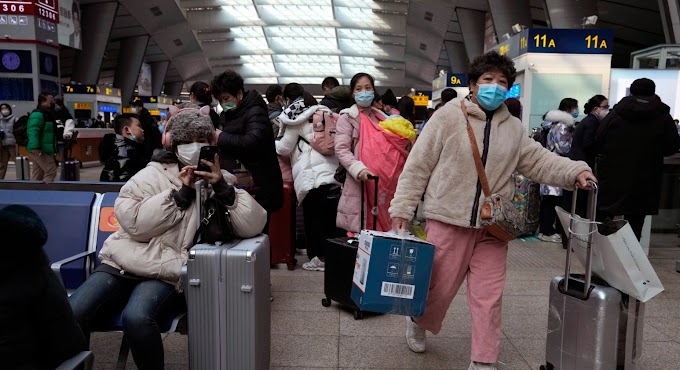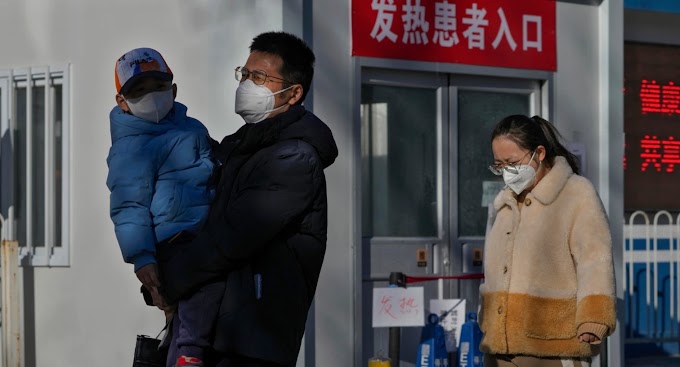Yuwen Vision Jiang Zemin's Legacy and Whether His Death Will Be an Unstable Factor for the CCP
WASHINGTON —
Editor's Note: This is an opinion piece written by Deng Yuwen for Voice of America. This guest commentary does not reflect the views of Voice of America. Reprinters please indicate that they are from Voice of America or VOA.
China's political culture emphasizes finality, and politicians especially value the evaluation of themselves by posthumous organizations. However, if we understand the coffin conclusion as judging the merits, demerits and influence of a political figure before and after his death from a historical perspective, it will be very different from the official evaluation—the latter is generally a compliment—or even completely reversed. come over.
Jiang Zemin, the former general secretary of the Communist Party of China who just passed away, received very high praise from the Chinese authorities, calling him a great Marxist, comparable to Deng Xiaoping. Leaving aside Xi Jinping’s intention behind elevating Jiang so much, the question is, even from the party’s point of view, whether Jiang is qualified to receive such a high evaluation, whether his political legacy left behind by the CCP has promoted historical progress, or whether he wants to contribute to China’s progress. Quite responsible for today's status quo?
 |
| File photo: A publicity board for various leaders of the Communist Party of China erected on the streets of Lhasa. (June 1, 2021) |
 |
| On October 19, 1992, Chinese leader Deng Xiaoping and CPC General Secretary Jiang Zemin met with members of the Central Committee |
In Jiang’s more than ten years in power, in the words of former Citibank director, Jiang biographer, and American Kuhn, he transformed China from a country “turbulent by the Tiananmen incident into a major engine of world economic development and commercial and cultural center, and become a vibrant and open country". Jiang carried out economic and state-owned enterprise reforms, established a preliminary market economy in China, joined the WTO, and locked China on the road to opening up; allowed capitalists to join the party, put forward the "Three Represents" thought, and promoted the certainty of democracy within the party. development and the expansion of social freedom. Of course, these were not mainly done by Jiang alone, but as the top leader of the CCP at that time, he still played a key role in it.
Specifically, Jiang left the following political legacy to the CCP and China:
First, the radical reform of state-owned enterprises during Jiang’s period, especially “grasp the large and let go of the small”, laid the foundation and prepared conditions for the establishment of a market economy in China; He eliminated interference to join the WTO, allowing China to move towards comprehensive economic opening and globalization, and to integrate with the world economic system. Before 1989, China's economic reform and economic opening were only in the preliminary stage. After 1992, the market economy system was introduced, and reform and opening up entered a new stage. The rapid development of China's economy came after this.
However, the reform and opening up during this period also created a lot of problems, mainly the shock therapy reform of state-owned enterprises, which bought out workers' seniority and drove them out of the factory. Although the overall economic efficiency was improved, it also caused inflation and severe unemployment. The state-intervened market economy with a socialist tail can only be called a semi-market economy at best, causing social polarization and power as a tool for wealth creation.
Second, Jiang's greatest contribution to the CCP is also the greatest political legacy he left to the party. His "Three Represents" thought reformed and broadened the class foundation of the CCP, making the workers and peasants proletarians that the CCP insisted on since the founding of the party. The class parties became the de facto parties of the whole people, of the elite and of the propertied classes. Jiang has the idea of transforming the CCP from a revolutionary party to a ruling party in his hands, but this requires reforming the party's theoretical and class foundations. The so-called reform, in the final analysis, is to make the private economy justifiable and become a second force that keeps pace with the state-owned economy. If the problem of capitalists joining the party is not solved theoretically, it will turn this originally supportive force of the party into an alien force, which is not conducive to stabilizing the CCP. rule.
Although the "Three Represents" thought expanded the political foundation of the CCP and marked the transformation of the CCP from a party of the proletariat to an elite party, Jiang failed to achieve the goal of transforming the CCP from a revolutionary party to a ruling party. The reason is that to become the ruling party, one must not only give up the thinking of the revolutionary party, but also give up the ruling method and interests of the revolutionary party, which cannot be achieved with Jiang's authority. In addition, the party no longer represents the interests of workers and peasants in theory, which further marginalizes the political status of workers and peasants, who account for the majority of the population.
Third, a difficult problem for the autocratic regime is the peaceful transfer of supreme power. Since there is no institutionalized way for the transfer of power, the transfer process is likely to be full of conspiracy, violence and even murder. Deng failed to solve this problem. The peaceful transfer of power by the top leader of the CCP was realized by Jiang, and a set of procedures and mechanisms were established for this purpose. This is another contribution he made to the CCP.
 |
| File photo: Former Chinese leader Jiang Zemin attends the 18th Party Congress at the Great Hall of the People in Beijing on November 8, 2012. |
However, while Jiang closed the door to life tenure for the CCP, he also opened a window for the elderly to intervene in politics. He did not hand over the most important post of Chairman of the Military Commission to Hu as scheduled. At this point, he is not even as good as Deng. To some extent, the old people in Deng's era had no choice but to intervene in politics. Because the Cultural Revolution destroyed the CCP's cadre system, at the beginning of the reform, there was a shortage of cadres, and a large number of veteran cadres who had been sidelined during the Cultural Revolution were needed to come out to work. However, after many years of his daughter-in-law becoming a mother-in-law, Jiang tasted what it was like to be a mother-in-law. He did not want to decentralize all powers. He inherited the tradition of old people meddling in politics and made it worse in the post-Deng era. Finally, he promoted Xi to the position of general secretary. , judging from today, this is his biggest failure.
Fourth, Jiang promoted the factional era in Chinese politics, which would have had the opportunity to lead the CCP toward inner-party democracy. Factions in the party existed during the Mao-Deng period, but because of their personal authority, they actually became the co-owners of all factions. Without the authority of these two, Jiang could only recognize the interests of different factions and establish the rules of the game for factional politics.
In China, the party is too powerful, and it is too difficult to initiate democracy from the society, and it is easy to be strangled by the party. If there are factions with different forces in the party, they compete with each other, and it is possible to gradually develop into a formal set of internal party competition. Rules thus lead to democracy. In Jiang's later period, theorists advocated inner-party democracy, and inner-party democracy would lead to social democracy, and Jiang also accepted this view. However, the imbalance of factional politics, Jiang’s faction is too strong, other factions are too weak, and the interest groups that have emerged in the reform, especially the red families in the party have not squeezed out the interests of the reform, and they do not want to damage their own interests by democratization too quickly, and The centralized system of the party itself emphasizes the uniqueness of the highest power, which makes the practice of inner-party democracy short-lived.
Fifth, although Jiang regarded banning the military from doing business as one of his three major political achievements during his term of office, in fact the CCP’s corruption broke out in Jiang’s period, and doing business for all people is actually corruption for all people, especially the privatization of state-owned enterprises created a feast of corruption, which led to Xi Later, he was able to successfully use anti-corruption to establish his totalitarian rule. In addition, Jiang is equally relentless in suppressing grassroots protests, non-government political dissident forces, religious freedom, and rights protection actions that threaten the CCP's rule. A representative example of this is his suppression of Falun Gong.
 |
| After Jiang Zemin passed away, Chinese people laid flowers outside his hometown in Yangzhou, Jiangsu. (December 1, 2022) |
Jiang's above-mentioned political legacy is intertwined with good and bad, and it is difficult to completely separate it. This makes people's evaluation of him controversial. Today, his death arouses public memory, of course, because the darkness of Xi’s regime is unbearable, so that any era of CCP leaders before Xi, except perhaps Mao, is worth remembering in people’s memory. Many political opponents of Xi hope that Jiang's death will trigger a massive rebellion against the current regime in China at a sensitive moment when China's "white paper movement" is emerging, just as Zhou Enlai's death triggered the April 5th Movement and Hu Yaobang's death It is the same as triggering June 4th. However, if you observe calmly, there is a high probability that this expectation will fail.
First of all, unlike Zhou and Hu's sudden death, Jiang passed away at the age of 96. There have been many reports of his critical illness before, and the society has expected this; secondly, the evaluation of Jiang by the authorities cannot be higher. Gao, appeased the faction of Jiang suppressed by Xi, so that they could not express their dissatisfaction; Thirdly, Jiang did not enjoy nearly unanimous favor with the living people of Zhou and Hu when he was alive. Again, Jiang has long since faded out of the public eye. Many of the young people in China protesting today have never heard of his name and cannot establish an emotional identity with him. A corresponding plan was made for social unrest. In view of this, even if someone wants to use Jiang's death to fuel this wave of social protests, it will be difficult for most people to respond and follow.
Among the party's political elders, Jiang's symbolism is the strongest. In this regard, his death marks the complete end of China's old-fashioned political tradition in Xi's era, and therefore, the complete fading of his political influence can be expected.








